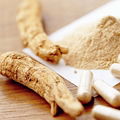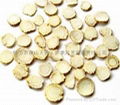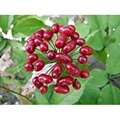| Model: | TD-AR |
|---|---|
| Brand: | - |
| Origin: | Made In China |
| Category: | Agriculture & Foods / Processed Food / Health Food |
| Label: | Organic Astragalus , Astragalus Root , Astragalus Slice |
| Price: |
-
|
| Min. Order: | - |
| Last Online:22 Aug, 2017 |
Astragalus (Astragalus membranaceus) has been used in Traditional Chinese Medicine (TCM) for thousands of years. It was often combined with other herbs to strengthen the body against disease. Astragaus is called an adaptogen, meaning it is thought to help protect the body against various stresses, including physical, mental, or emotional stress.
Astragalus may help protect the body from diseases such as cancer and diabetes. It contains antioxidants, which protect cells against damage caused by free radicals, byproducts of cellular energy. Astragalus is used to protect and support the immune system, for preventing colds and upper respiratory infections, to lower blood pressure, to treat diabetes, and to protect the liver.
Astragalus has antibacterial and anti-inflammatory properties. It is sometimes used on the skin for wounds. In addition, studies have shown that astragalus has antiviral properties and stimulates the immune system, s esting that it may help prevent colds.
In the United States, researchers have looked at astragalus as a possible treatment for people whose immune systems have been weakened by chemotherapy or radiation. In these studies, astragalus supplements seem to help people recover faster and live longer. Research on using astragalus for people with AIDS has produced mixed results.
Recent research in China s ests that, because astragalus is an antioxidant, it may help people with severe forms of heart disease, relieving symptoms and improving heart function. At low-to-moderate doses, astragalus has few side effects. However, it does interact with a number of other herbs and prescription medications. Astragalus may also be a mild diuretic, meaning it helps the body get rid of excess fluid.
Astragalus is a perennial plant, about 16 - 36 inches tall, that is native to the northern and eastern parts of China as well as Mongolia and Korea. It has hairy stems with leaves made up of 12 - 18 pairs of leaflets. The root is the medicinal part, and is usually harvested from 4-year-old plants.
The dried root is used medicinally.
Astragalus has been used for the following:
Astragalus root may be available in a variety of forms:
Pediatric
There is not a lot of scientific evidence about giving astragalus to children, so ask your doctor first. According to Traditional Chinese Medicine, you should not give astragalus to a child with fever because the herb may make the fever last longer or grow stronger. Any dosage should be determined by your doctor.
Adult
Doses from 1 - 25 g per day are sometimes used. Higher doses may suppress the immune system. For best results, it is recommended to use a standardized astragalus supplement. Recommended doses are as follows:
At recommended doses, astragalus has no serious side effects and can generally be used safely. It does interact with other herbs and medications (see Possible Interactions section).
There is not much evidence about whether astragalus is safe for women who are breastfeeding or nursing. Talk to your doctor before taking any medication, including herbs.
If you take any of the following medications, you should not use astragalus without first asking your doctor:
Drugs that suppress the immune system -- Astragalus may interfere with how these drugs act. If you have an autoimmune disease such as rheumatoid arthritis or lupus, or take cyclophosphamide, a medication used to reduce the chances of rejection in transplant recipients, or corticosteroids, do not take astragalus.
Lithium -- Astragalus can make it harder for the body to get rid of lithium, so dangerously high levels of the drug could build up.
Astragalus membranaceus; Astragalus mongholicus; Huang-qi; Milk-vetch root
Chen KT, Su CH, Hsin LH, et al. Reducing fatigue of athletes following oral administration of huangqi jianzhong tang. Acta Pharmacol Sin. 2002;23(8):757-761.
Duan P, Wang ZM. [Clinical study on effect of Astragalus in efficacy enhancing and toxicity reducing of chemotherapy in patients of malignant tumor]. Zhongguo Zhong Xi Yi Jie He Za Zhi.2002;22(7):515-517.
Hao Y, Qiu QY, Wu J. [Effect of Astragalus polysaccharides in promoting neutrophil-vascular endothelial cell adhesion and expression of related adhesive molecules]. Zhongguo Zhong Xi Yi Jie He Za Zhi. 2004;24(5):427-430.
Hei ZQ, Zhang JJ, Lin SQ, et al. [Effects of Astragalus membranaceus injection on nitric oxide and endothelin concentration of intestinal mucosa after hemorrhage shock-reperfusion in rats]. Zhongguo Zhong Yao Za Zhi. 2004;29(5):444-447.
Kim SH, Lee SE, Oh H, et al. The radioprotective effects of bu-zhong-yi-qi-tang: a prescription of traditional Chinesemedicine astragalus. J Chin Med. 2002;30(1):127-137.
Mao SP, Cheng KL, Zhou YF. [Modulatory effect of Astragalus membranaceus on Th1/Th2 cytokine in patients with herpes simplex keratitis]. Zhongguo Zhong Xi Yi Jie He Za Zhi. 2004;24(2):121-123.
Matkovic Z, Zivkovic V, Korica M, et al. Efficacy and safety of Astragalus membranaceus in the treatment of patients with seasonal allergic rhinitis. Phytother Res. 2010;24:175-81.
Shao BM, Xu W, Dai H, et al. A study on the immune receptors for polysaccharides from the roots of Astragalus membranaceus, a Chinese medicinal herb. Biochem Biophys Res Commun. 2004;320(4):1103-1111.
Shi FS, Yang ZG, Di GP. [Effect of Astragalus saponin on vascular endothelial cell and its function in burn patients]. Zhongguo Zhong Xi Yi Jie He Za Zhi. 2001;21(10):750-751.











